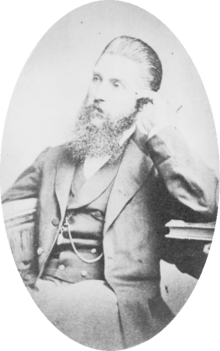Adolf Jensen
Adolf Jensen (12 January 1837 – 23 January 1879) was a German pianist, composer and music teacher, and was the brother of Gustav Jensen (1843–1895) who was a violinist and composer.[1]

Biography
Jensen was born in 1837 in Königsberg to a family of musicians. Although largely self-taught, he also had instruction from Louis Ehlert, Louis Köhler and Friedrich Marpurg (1825–1884). Marpurg was the director of the Königsberg Theater and the great-grandson of the music theorist Friedrich Wilhelm Marpurg. In 1856 Jensen went to Russia to teach in the hope of earning enough money to take lessons with Robert Schumann with whom he had been in correspondence. However, Schumann had died in the interim. In 1857 he became was the music director of the Posen City Theater. From 1858 until 1860 he lived in Copenhagen and befriended Niels Gade. He returned Königsberg and composed much of his music during that time. He taught advanced piano at Carl Tausig's "Schule des höheren Clavierspiels" in Berlin from 1866 until 1868 when serious illness forced him to retire. He went to Dresden, and then to Graz in 1870 and finally to Baden-Baden where he died of tuberculosis at the age of 42.[1][2][3][4]
Works
Jensen wrote about 160 art songs as well as choral pieces. His music for piano includes a Sonata in F-sharp minor (Op. 25), a set of 25 Études (Op. 32), and Erotikon, Op. 44, seven pieces depicting scenes from Greek legends. He also wrote music for piano four hands.[3][4]
His orchestral music consisted of a Concert Overture in E minor and a Geistliches Tonstück. He started work on opera Die Erbin von Montfort in 1864-65, but did not finish it. After his death, Wilhelm Kienzl adapted the music to a new libretto, Turandot, written by Jensen's daughter Elsbeth, who wrote under the pseudonym "Egbert Jensen".[5][4]
References
- Latham, Alison (ed.) (2011). "Jensen, Adolf". The Oxford Companion to Music. Oxford University Press. ISBN 0199579032. Online excerpt retrieved from Oxford Index 20 March 2019.
- Naumann, Emil (1886). The History of Music, p. 1203. Cassell.
- Thym, Jürgen (1983). One Hundred Years of Eichendorff Songs, p. xiv. A-R Editions Inc. ISBN 0895791730
- Grove, George (1900). "Jensen, Adolph". A Dictionary of Music and Musicians, Vol. 2. Macmillan
- Griffel, Margaret Ross (2018). Operas in German: A Dictionary, p. 489. Rowman & Littlefield. ISBN 1442247975
Further reading
- Petty, Wayne C. (March–July 2003). "Brahms, Adolf Jensen and the Problem of the Multi-Movement Work". Music Analysis, Vol. 22, No. 1/2, pp. 105–137. Wiley (subscription required)
External links
- Free scores by Adolf Jensen at the International Music Score Library Project (IMSLP)
- Audio: "Lehn' deine Wang' an meine Wang'" by Jensen sung by George Hamlin, recorded in 1912 on the Victor label (Library of Congress, requires Adobe Flash)